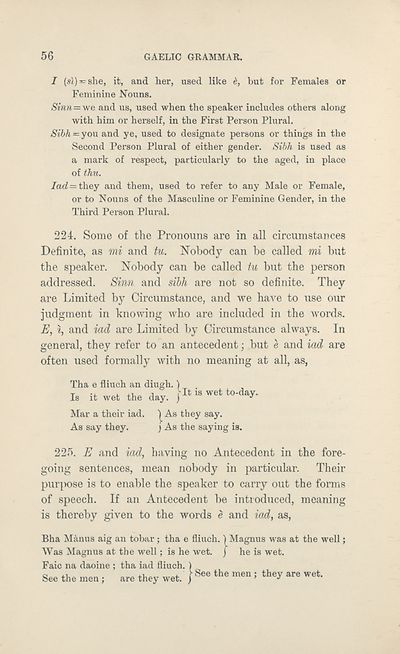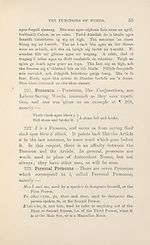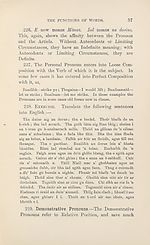Download files
Complete book:
Individual page:
Thumbnail gallery: Grid view | List view

56
GAELIC GRAMMAR.
I (si) = she, it, and her, used like but for Females or
Feminine Nouns.
Sinn=we and us, used when the speaker includes others along
with him or herself, in the First Person Plural.
Sibh = you and ye, used to designate persons or things in the
Second Person Plural of either gender. Sibh is used as
a mark of respect, particularly to the aged, in place
of thu.
/ad = they and them, used to refer to any Male or Female,
or to Nouns of the Masculine or Feminine Gender, in the
Third Person Plural.
224. Some of the Pronouns are in all circumstances
Definite, as mi and tu. Nobody can be called mi but
the speaker. Nobody can be called tu but the person
addressed. Sinn and sibh are not so definite. They
are Limited by Circumstance, and we have to use our
judgment in knowing who are included in the words.
E, i, and iad are Limited by Circumstance always. In
general, they refer to an antecedent; but e and iad are
often used formally with no meaning at all, as,
Tha e fliuch an
Is it wet the
diugh. |
day. J
It is wet to-day.
Mar a their iad. | As they say.
As say they. ) As the saying is.
225. E and iad, having no Antecedent in the fore¬
going sentences, mean nobody in particular. Their
purpose is to enable the speaker to carry out the forms
of speech. If an Antecedent be introduced, meaning
is thereby given to the words e and iad, as,
Bha Manus aig an tobar; tha e fliuch. | Magnus was at the well;
Was Magnus at the well; is he wet. j he is wet.
Faic na daoine ; tha iad fliuch.)
See the men ; are they wet. \ ®ee *‘le men ’ are we*'
GAELIC GRAMMAR.
I (si) = she, it, and her, used like but for Females or
Feminine Nouns.
Sinn=we and us, used when the speaker includes others along
with him or herself, in the First Person Plural.
Sibh = you and ye, used to designate persons or things in the
Second Person Plural of either gender. Sibh is used as
a mark of respect, particularly to the aged, in place
of thu.
/ad = they and them, used to refer to any Male or Female,
or to Nouns of the Masculine or Feminine Gender, in the
Third Person Plural.
224. Some of the Pronouns are in all circumstances
Definite, as mi and tu. Nobody can be called mi but
the speaker. Nobody can be called tu but the person
addressed. Sinn and sibh are not so definite. They
are Limited by Circumstance, and we have to use our
judgment in knowing who are included in the words.
E, i, and iad are Limited by Circumstance always. In
general, they refer to an antecedent; but e and iad are
often used formally with no meaning at all, as,
Tha e fliuch an
Is it wet the
diugh. |
day. J
It is wet to-day.
Mar a their iad. | As they say.
As say they. ) As the saying is.
225. E and iad, having no Antecedent in the fore¬
going sentences, mean nobody in particular. Their
purpose is to enable the speaker to carry out the forms
of speech. If an Antecedent be introduced, meaning
is thereby given to the words e and iad, as,
Bha Manus aig an tobar; tha e fliuch. | Magnus was at the well;
Was Magnus at the well; is he wet. j he is wet.
Faic na daoine ; tha iad fliuch.)
See the men ; are they wet. \ ®ee *‘le men ’ are we*'
Set display mode to:
![]() Universal Viewer |
Universal Viewer | ![]() Mirador |
Large image | Transcription
Mirador |
Large image | Transcription
| An Comunn Gàidhealach > An Comunn Gàidhealach Publications > Scottish Gaelic as a specific subject > (60) |
|---|
| Permanent URL | https://digital.nls.uk/125955737 |
|---|
| Description | This contains items published by An Comunn, which are not specifically Mòd-related. It includes journals, annual reports and corporate documents, policy statements, educational resources and published plays and literature. It is arranged alphabetically by title. |
|---|
| Description | A collection of over 400 items published by An Comunn Gàidhealach, the organisation which promotes Gaelic language and culture and organises the Royal National Mòd. Dating from 1891 up to the present day, the collection includes journals and newspapers, annual reports, educational materials, national Mòd programmes, published Mòd literature and music. |
|---|---|
| Additional NLS resources: |
|

